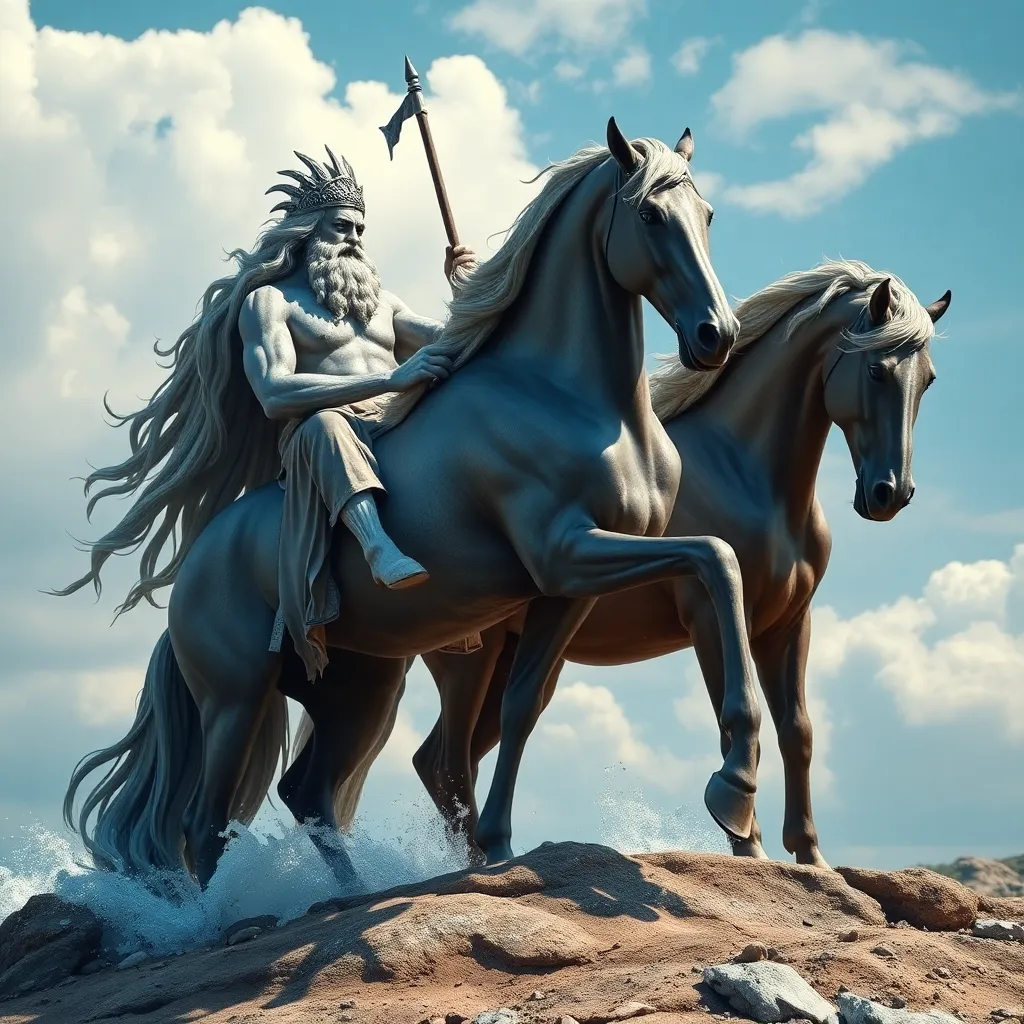The Connection Between Poseidon and Horses in Greek Mythology
I. Introduction
In the rich tapestry of Greek mythology, Poseidon stands out as one of the most formidable deities. Known primarily as the god of the sea, he also holds dominion over earthquakes and horses. This article explores the fascinating connection between Poseidon and horses, shedding light on how this relationship has shaped Greek cultural narratives.
II. Poseidon: God of the Sea and Earthquakes
Poseidon is often depicted as a powerful figure, wielding a trident and accompanied by various sea creatures. His attributes and powers encompass:
- God of the sea, ruling over all bodies of water.
- Controller of storms and earthquakes, earning him the title “Earthshaker.”
- Creator of horses, symbolizing his multifaceted nature.
Historically, Poseidon was a significant figure in ancient Greek religion, worshipped across various city-states. His cult was particularly prominent in coastal areas, where the sea played a vital role in daily life and commerce. Temples dedicated to Poseidon, such as the Temple of Poseidon at Sounion, testify to his importance in the pantheon of Greek gods.
III. The Birth of Horses: Myths and Legends
One of the most captivating myths surrounding Poseidon is the story of how he created the first horse. According to legend, Poseidon fashioned the horse from the sea foam and breathed life into it, showcasing his creative powers. This act not only illustrates his connection to horses but also emphasizes his role as a creator deity.
In addition to Poseidon’s narrative, other mythological accounts also explore the origins of horses:
- In some versions, horses are said to have emerged from the blood of the Gorgon Medusa, after she was slain by Perseus.
- The goddess Athena is also credited with creating the horse, competing with Poseidon for the title of the horse’s creator.
These myths highlight the significance of horses in Greek culture while emphasizing Poseidon’s unique role in their origin story.
IV. Poseidon’s Role as a Horse God
In addition to his sea-related responsibilities, Poseidon is recognized as a horse god, frequently referred to as “Hippios.” This title underscores his duality as both a deity of water and a god of horses. The association between Poseidon and horses is significant for several reasons:
- Horses were essential for transportation, warfare, and agriculture in ancient Greece.
- Poseidon’s connection to horses symbolizes strength, power, and nobility.
This duality enriches Poseidon’s character, allowing him to embody both the fierce nature of the sea and the noble qualities of horses.
V. Symbolism of Horses in Greek Culture
Horses held a prominent place in ancient Greek society, symbolizing power, status, and wealth. They were not only vital for practical purposes but also featured prominently in mythology and literature. In the context of Poseidon, horses represented:
- Power: Horses were often associated with the elite, reflecting the owner’s status.
- Victory: Chariot races, which relied heavily on horses, were integral to Greek sporting events, symbolizing triumph and glory.
- Divine favor: Owning fine horses was seen as a sign of the gods’ blessings, particularly from Poseidon.
Thus, Poseidon’s association with horses further solidified his significance in the eyes of the ancient Greeks, linking him to the ideals of strength and nobility.
VI. The Connection to Other Mythological Figures
Poseidon’s influence extends beyond his own realm, connecting him to various other mythological figures associated with horses. Notable relationships include:
- Chiron: The centaur known for his wisdom and healing abilities, Chiron is often depicted as a skilled horseman, symbolizing the harmonious relationship between humankind and horses.
- Demeter: In some myths, Demeter’s daughter, Persephone, is said to have been abducted by Hades while riding a horse, linking the theme of horses to vital agricultural cycles.
These interconnected stories highlight the broader significance of horses in Greek mythology and their relationship with Poseidon.
VII. Artistic Representations of Poseidon and Horses
Artistic depictions of Poseidon often feature him alongside horses, emphasizing their connection. Ancient art showcases this relationship in various forms:
- Vases: Many vases from the Archaic and Classical periods depict Poseidon riding a chariot pulled by horses.
- Sculptures: Statues and reliefs often illustrate Poseidon commanding sea creatures alongside horses, symbolizing his dominion over both realms.
- Frescoes: In places like Pompeii, frescoes depict scenes of Poseidon with horses, further solidifying their connection.
The influence of these artistic representations has persisted, continuing to shape the interpretation of Poseidon in modern culture.
VIII. Conclusion
In summary, Poseidon’s multifaceted relationship with horses reveals a complex interplay between his roles as the god of the sea, earthquakes, and the horse god. This connection illustrates the significance of horses in ancient Greek society and mythology, symbolizing power, nobility, and divine favor.
Ultimately, the enduring legacy of Poseidon’s connection to horses can be seen in modern culture, where horses continue to symbolize strength and beauty, echoing the ancient beliefs that once surrounded the mighty god of the sea.




